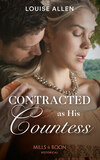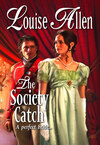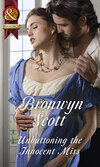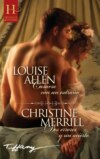Kitabı oku: «Contracted As His Countess», sayfa 3
At last the groom led his horse into the courtyard and she had something safe to talk about. ‘What a lovely animal.’
‘Thank you. His name is Altair. He is Irish and has great stamina. Do you ride?’
‘Yes. I have a palfrey.’ He looked surprised by her choice of word. ‘She has an ambling gait, if you understand the term. They are rare nowadays, of course.’
‘I would be interested to see it. But does that mean you do not ride with a modern lady’s saddle?’
She nodded. ‘I suppose that is something else I must learn.’
‘Or you would attract a great deal of interest in Hyde Park. I believe the medieval side saddle involves sitting with your feet on a board?’
He surprised a laugh from her. ‘In the Middle Ages most women rode pillion or they rode as I do, astride.’
‘Not in Hyde Park you do not!’ The groom looked over and Jack dropped his voice. ‘Or anywhere else you might be seen. I will teach you to ride side saddle after we are married.’
‘Thank you.’ She suspected that would be far more limiting than she was used to and riding, along with her garden, was her great freedom, her escape. ‘But Catherine the Great of Russia rode astride, I believe.’
‘Catherine the Great did a number of things I would be alarmed to see my wife doing,’ he said. There was something in his voice that made her think that most of those things were thoroughly shocking and he had no intention of telling her about them. She would find a book and discover for herself.
‘I must be gone.’ Jack Ransome took her hand and raised it to his lips with a courtly gesture that took her aback. ‘Today has been a day of surprises, Madelyn.’
‘Pleasant ones?’ she asked, knowing what the true answer would be.
His eyes narrowed and she wondered if he thought she was trying to flirt. ‘Some of them. Cultivate your garden, my lady. I will write to you.’
Madelyn climbed to the top of the gatehouse tower and watched Jack ride away on his big horse. He took the far slope at an easy canter, sitting relaxed and very much at home in the saddle. She stood there, thinking for a long while after he had vanished from sight. That man was going to be her husband. She would lie with him, know that long, hard body. She would share the trivial day-to-day incidents of domestic life with him. She might grow old with him. She would come to know the real man behind that carefully controlled exterior.
The breeze strengthened, snapping the banners over her head, sending her hair whipping across her face. Madelyn shivered and went to find Mr Lansing, who had been her father’s employee and who was now, with quite clearly gritted teeth, working for her.
Her father had told her nothing of his affairs because, as he said, women’s brains were not made for such matters. She suspected that it was a question more of education and expectation than mental capacity and at first she had no expectation that Mr Lansing would think any differently.
She had been resigned to a state of ignorance, then, months after her father’s death, she heard the groom and the coachman discussing someone who had died in the village. His heir, it seemed, had been disgruntled to find the will left the dead man’s money and possessions to him, but only after the payment of his mortgages, debts and loans.
‘Which is a fair old amount,’ Tom, the coachman, had said. ‘Still, I don’t know why he was grumbling, it is how it is always worded.’
But there had been nothing about debts, loans or mortgages in her father’s will. She wondered about it for a few days and the wondering had turned to worry. What if there were debts? Loans and mortgages, she assumed, would be paid at their due time by Mr Lansing. But debts? It would be very like her father to neglect to pay local people until he absolutely had to.
Now she realised that she had to make certain. Lansing was at his desk, surrounded by ledgers. He put down his pen and stood up when she entered, very correct and polite, but she could tell he was repressing a sigh at the interruption.
‘Mr Lansing, did my father leave debts, loans and mortgages?’
‘Well, yes, Mistress Aylmer.’ He did not meet her gaze, but began to fiddle with his pen. ‘That is normal for any gentleman. Loans and mortgages assist with the flow of money…’
‘Yes, yes. But debts?’
‘There were some, yes,’ he said cautiously.
‘And they are still outstanding?’
‘Yes. It was the Master’s instructions that they were to be paid only on the threat of… I mean, not immediately.’
‘I see.’ And she could, only too well. No wonder her father was a rich man if he never paid those he owed until the point of legal action. He had used loans and mortgages to make his money work all the harder, she supposed, but she was hazy about how that would function.
‘Well, Mr Lansing, my instructions are that all outstanding debts will be paid in full immediately. All future bills will be met within the month and all loans and mortgages will be repaid.’ The man’s jaw dropped. ‘I am getting married, Mr Lansing, and I wish to start married life with an absolutely clear slate.’
‘I… But, Mistress Aylmer, I would have to make some sales to meet those obligations at short notice. The debts are one thing, but the other obligations… It is very complex, you understand.’
‘No, I do not. There is this estate and there are the Dersington lands. It appears simple.’
‘Well…er…yes. Although there is also the… I mean, it will be necessary to sell out of funds, sell some property.’
‘I thought my father was a rich man.’ She turned to stare at him. Had Lansing been dipping into the money chests?
‘He was, he was, Mistress. But finance is a complex matter. Having cash sitting around is bad policy—it needs to be out there, working and earning.’ He was gabbling now. ‘This sort of demand at short notice—’
‘Do it, Mr Lansing. You will not sell any of the Dersington properties, you understand. It is Lord Dersington that I am to marry.’
‘I am certain His Lordship will not wish for anything hasty to be done. You do not quite understand—’
‘It seems quite clear to me. And I assume you are perfectly aware of the trust relating to this property. Are you telling me that what I am asking is impossible for some reason?’
‘No, Mistress Aylmer. But—’
‘Do you wish to retain your position, Mr Lansing? Because it seems to me that you are very reluctant to carry out my instructions. And I am your employer.’ Inwardly, she was quaking. What had come over her? In one day she had proposed to a complete stranger and now she was threatening someone who had been in her father’s employment for years. She never threatened anyone, not even the most careless kitchen maid.
‘Of course, Mistress Aylmer. It will be exactly as you order.’
The poor man has gone quite pale. I am as bad a bully as my father, it seems.
‘Thank you, Mr Lansing. That is very satisfactory,’ Madelyn said with a smile.
She left him mopping his brow with a vast spotted handkerchief. Now he was probably even more convinced that women were not capable of dealing with financial matters, but she did not care. She would not have unpaid debts to hardworking people on her conscience.
Chapter Four
15th August
The settlements having been agreed and signed, and given that your period of mourning has passed, I suggest that now would be the best time for you to come to London to acquire your trousseau and for us to make arrangements for the wedding.
Madelyn tapped one finger on the page as she looked out of the carriage window and tried to decide whether what she was feeling—besides plain panic, of course—was irritation or apprehension.
I have engaged the services of a companion for you.
Louisa, Lady Fairfield, is a widow in her thirties with admirable connections. I am sure you will find her of the greatest use as you accustom yourself to London life.
Of course what Lord Dersington really meant was as you are dragged kicking and screaming into the nineteenth century. That and, as you are remodelled so as not to embarrass me.
It was definitely panic churning inside her, she decided. And irritation with the bland euphemisms her betrothed was using and the way he was making decisions without consulting her.
If you would be so good as to inform me of a convenient date I will send a coach with outriders and the abigail that Lady Fairfield has found for you.
It was amazing how temper calmed nerves. Perhaps it was the novelty—she had never been allowed, or allowed herself, to lose her temper. Madelyn inhaled a long, calming breath, then let it go as she read on, even though she could probably have recited the letter by heart now.
Naturally, if the woman does not suit, then changes can be made when you reach here.
I am assuming that you will wish to reside at the Dersington town house in St James’s Square. Your man of business informs me that it has been maintained in good order, although it has not been occupied for some months. He assures me that the building will be prepared for your arrival and a full complement of staff engaged.
Trusting that this finds you in good health,
Yours,
J.R.
There really was nothing to take exception to, she told herself for perhaps the fiftieth time as the carriage rolled into Sittingbourne. She had agreed to marry the man and she had to learn how to go on in fashionable society. Everything he had done was correct, scrupulously so. That was probably what was so annoying, Madelyn concluded. That and her own naivety. Jack Ransome was not her lover, or her friend. He was not even an acquaintance and it was foolish to think of him as any of those things. This was an arranged marriage between strangers, organised by her father from beyond the grave. She should be grateful that her betrothed did not insult her with protestations of emotions he did not feel, or expect her to pretend reciprocal affection.
‘Miss Aylmer? Do you wish to go into the inn to take refreshment?’
That was another thing. Maud Harper, the abigail who had arrived with the carriage and its two outriders, two grooms and coachman, was perfect. Of course she was. Competent, tactful and highly skilled. Chosen to perform a transformation.
‘Thank you, Harper, no.’ Then she thought again. She did not want to use the facilities, but the maid perhaps did and would be too well trained to leave her mistress alone while she did so. ‘On the other hand, it would be sensible to take a cup of coffee and, er, so forth.’
They trooped into the George Inn, footman in front to open doors, Harper one step behind. Her new gown, sent down by the unknown Lady Fairfield, seemed insubstantial and far too flimsy; the unaccustomed stays were uncomfortable; the weight of her hair, plaited, crimped and caught up by some alchemy of Harper’s, was entirely wrong, leaving the nape of her neck cold and exposed. The image staring back at her from the mirror had seemed totally unfamiliar—nose too long, lashes too pale, bone structure lost against curls and frills.
The landlord remembered her esteemed father so there was much bowing and scraping even though the carriage was a hired vehicle, as were its horses, driver and grooms. She had wondered that the Earl had not sent his own carriage, then realised that he probably did not own one. It was interesting, she thought fleetingly, that he had not been spending her money in anticipation.
I am going to have to get used to this, too, Madelyn thought, sipping a cup of coffee she disliked but knew she was must learn to drink and pretend to enjoy. Is this what prisoners feel like when the gates swing open after years of captivity and their longed-for freedom proves to be a frightening new world? I want my garden. My moat. My walls. My safety.
It was not until the carriage had rolled over the drawbridge, sending echoes rumbling round the old walls, that she realised that over the past few months she had been free. Free of the fear of her father’s tempers, emancipated to do as she wished, to think as she wished. And she had not taken the opportunity to change anything, she realised with a pang of something close to anger with herself. She had been set at liberty and now she was closing the door of the cage again, of her own will.
Before, she had no control over any aspect of herself or life except for the thoughts in her head, but at least she knew her father, could predict his moods, his actions. Very soon she would be entirely at the mercy of a man who was alien to her. Jack Ransome might be an apparently considerate alien, but he could as well be from distant Japan for all she understood about his world. She doubted he was feeling kindly disposed towards the woman who would restore his lands at the price of his pride.
Lord Dersington had sent a punctilious letter every week enquiring after her health while telling her absolutely nothing about himself or what he was doing.
Other than constructing my new world, my new identity, of course.
Madelyn gave herself a mental shake, something that she was finding herself doing almost hourly. Either she could stay walled up in her castle or she could come out and learn to live in the real world, and it was wrong to fight the process to make her fit for that world. Ungrateful.
‘Shall I pour you another cup, Miss Aylmer?’
‘No, thank you, Harper.’ The cup rattled in the saucer as she put it down and there was a rushing sound in her ears.
What is the matter with me?
The room steadied after a moment and Madelyn stood up, managing a smile for the maid who was looking at her anxiously. ‘It is so stuffy in here. Shall we go?’

London appalled her. It was like an overturned ant heap with human-sized ants. Noisy, dirty, feral ants that seemed furiously busy, scurrying in all directions amid smoke and smells and crowded chaos. Harper seemed to be proud of what they were seeing out of the windows and kept up a running commentary. Madelyn forced herself to pay attention and to learn.
‘This is Blackfriars Bridge, ma’am. And there’s St Paul’s—you get ever such a good view of the dome from here. And now this is Fleet Street and here comes Temple Bar and we’re out of the City now, ma’am.’
The Strand, Northumberland House, Charing Cross… ‘There’s Whitehall, ma’am, with Westminster Abbey right down at the end of it and all the government offices and Parliament. Now we are in Pall Mall. Look, ma’am, here’s Carlton House where the Prince Regent lives. They say it’s ever so splendid inside, all gold. I expect you’ll be going to receptions there soon enough.’
Madelyn had a glimpse of white stone and a screen of pillared railings with a courtyard behind and a crowd peering in and then the carriage swung sharply to the right.
‘We’re almost there, ma’am. This is St James’s Square.’
There were fine tall houses, although so tight together it must surely be impossible to be ignorant of one’s neighbours’ business. In the centre was a railed, circular enclosure with some water inside that and a statue in the middle. There was no grass and it seemed very bleak. The throng of vehicles and pedestrians made it seem worse, somehow.
‘No gardens? I thought London squares had gardens.’
‘Not all of them, ma’am. But the house does, a fine big one at the back.’
The carriage came to a halt outside a house with a flight of steps up to a wide glossy black door that was opened so perfectly in time with their stopping that someone must have been watching out for them, Madelyn realised. Two footmen came down the steps, the carriage door was opened, she was handed out and bowed into the house by a rotund little man, all in black, with a striped waistcoat.
‘Partridge?’ That was the name of her new butler, according to Mr Lansing who had written to the best London agency to secure the staff. Given the cosy shape of this man his name seemed all too appropriate.
‘Miss Aylmer. Welcome home.’
Home? I suppose it must become that. This is the beginning of my new life.
She blinked at the amount of gilding in the hall, the highly polished furniture, the torchères at the foot of the staircase. ‘It seems very…shiny.’ She had ordered the changes, of course, researched them meticulously as she had been taught by her father, but she had not expected how very bright everything would look.
‘Yes, Miss Aylmer. Your steward—Mr Lansing, is it not?—he told me that you wished the house renovated to the highest standard. He has directed a firm of decorators and upholsterers according to your instructions, and of course items have been arriving from Gillow’s and Heal’s, but I fear only the main rooms on the ground floor have been completed so far. The drawing room is here, ma’am. Tea will be served immediately.’
‘Thank—’ Crocodiles? Madelyn stopped dead on the threshold. ‘Oh, yes, of course. The Egyptian fashion.’ They seemed to be life-sized and somehow she had not imagined that. The totality of the objects she had studied in catalogues and from drawings were overwhelming when she saw them all assembled. She gazed round at more gilt, couches with scaly crocodile legs, lamp holders in the shape of turbaned figures and an array of what appeared to be miniature pagodas on the mantelpiece.
‘I understand that your orders were for the house to be redecorated in the latest style, Miss Aylmer.’ Partridge stared around him as though seeing the room for the first time, his feathers decidedly ruffled by her reaction. ‘Mr Lansing assures me that everything ordered is in the current mode.’
‘Oh, yes. It is. This is what I decided upon,’ she agreed faintly. It was hideous, she hated it and the light flooding in from the large windows made it all worse. Madelyn reminded herself that immersion in the Middle Ages was not going to be a fit preparation for appreciating contemporary style. ‘This is following the Prince Regent’s taste, I understand.’ She knew a little of that. Her father—who would be turning in his grave if he had any idea of what she had perpetrated here—had ranted about it for what had seemed like weeks after attending a reception at Carlton House. That had been followed by a letter from a fellow medievalist who was in shock after an ill-advised visit to the Pavilion at Brighton.
‘A hideous cacophony of styles, no research, gimcrack fakery’ had been the mildest of her father’s opinions.
But if this was the mode then she would have to accustom herself to it and at least Jack could not fault her for allowing the house to be neglected, or for skimping on her research and on the quality of the objects ordered. Not that the house had been allowed to fall into any kind of disrepair. There had been a succession of highly respectable tenants, Mr Lansing had assured her, just as there were with all of the Dersington properties her father had acquired that were fit to be rented out.
All the tenancies were on short leases, but this house had been let furnished and would have seemed hopelessly outdated now, she was sure. There were still the other floors to be dealt with, of course, but perhaps Jack would tolerate that if the public rooms were acceptable.
The tea tray arrived, shortly followed by Harper to announce that hot water could be taken up the moment Miss Aylmer expressed a wish to bathe. The maid had been tight-lipped over the facilities at the castle, although Madelyn was not sure what the woman expected. Her mother had, after all, made one of her rare protests when her husband had wanted to use the medieval garderobes—draughty little turrets with an alcove equipped with a plank seat with a hole and a long drop to the moat below. Mama had insisted on an earth closet in the inner court, although baths had to be taken in large wooden vats that were lined with linen sheets before the water was poured in.
‘I will take a bath in half an hour,’ she told Harper. ‘First I will finish my tea and write a note to…’ How would Jack want to be addressed now? Was he using his title yet? ‘To Lady Fairfield to let her know I have arrived. Do you have her direction?’
‘A footman went as soon as you arrived, Miss Aylmer. Mr Ransome’s orders.’
That answered her question as far as the staff were concerned, although she had no idea when he would make a general announcement that he was accepting the title.
Madelyn pushed down the feeling of resentment at being managed and told herself it was a thoughtful gesture and showed her betrothed’s concern. She put down her cup, jumped at the sound of the door knocker and winced as the spindly table rocked on its faux bamboo legs.
‘What the hell?’ demanded a voice from the hall.
‘Sir.’ Partridge’s fluting tones carried clearly through the half-open door. ‘Miss Aylmer—’
‘Miss Aylmer had better be at home, because I want to talk to her. Now.’ Jack’s voice was unmistakable, even through the anger.

As the cab rattled along Piccadilly towards St James’s Street, Jack decided that he had reason to be pleased with himself. He had managed to secure the assistance of an excellent companion and social tutor for Madelyn and the staff for the London house had been appointed through Madelyn’s man of business, Lansing.
With the wedding he would begin to use the title and he saw no problem with that, other than the inevitable gossip. His claim had been ratified by both the House of Lords and the College of Heralds on the death of his brother and he could expect nothing but approval now that he was finally accepting it.
None of the arrangements had been problematic—the difficult thing was not demanding the keys and taking possession of the house in St James’s Square the moment he arrived back in London. It was not his yet, he had reminded himself more than once over the past weeks as the temptation built like a dull ache.
The family seat, Dersington Mote, was in Suffolk. It was ancient and should have been the place he yearned for, he supposed. But he’d had a miserable childhood there, one he was in no hurry to remember. As his grandfather became older and more confused the old man was happier in the London house, which was smaller, warmer, a little faded and old fashioned, but a home where he was less disorientated by the world. With his mother dead, his grandparents had taken their younger grandson to live with them, and Jack had loved the house. The Earl might be vague about who he was most of the time, but he was invariably kind and Jack’s grandmother was indulgent to a boy who would sit and listen for hours to her read out loud or tell stories.
Now it would be his again. He could almost feel the worn leather of the desktop in the study under his fingers, smell the familiar scent of lemon and beeswax polish, pipe smoke and his grandmother’s lavender soap.
Soon he would set foot in that room for the first time in more than six years. When his grandparents died his father made the house his London base and Jack had removed himself before he was thrown out. First he wanted to drop into Brooks’s where his post was directed when he was out of town. He had been accepted as a member years ago, before his father died and, despite the fact that most of his fellow members considered that he was letting them all down by refusing to use the title, he ignored the dark looks and mutterings for the sake of convenience. The wives of the members were concerned only that he, landless, did not flirt with their impressionable daughters who should be making good matches, or lure their sons into the kind of dissipation his brother and father had been infamous for. They generally ignored him, omitted him from their guest lists and pretended the aristocratic black sheep did not exist.
It was ironic, he had thought in the early days when the snubs and whispers had hurt. His father and brother had been frivolous, spendthrift, indolent wastrels, but they were accepted. Jack had neither the taste, nor the time and money, for indiscriminate wenching, reckless gambling or drinking himself into a stupor, but he was the one looked down on.
His fellow aristocrats might despise him, but they did not shun his talents for solving problems on their behalf. He had spent the past week in Lincolnshire, concluding the last commission he intended taking, and wondered if he would miss the work. Not the tedium, of which there was plenty, but the puzzle of solving a problem and the occasional excitement, even danger. This last case had involved the plausible gentleman who had insinuated his way into the life of a certain young viscount, much to the alarm of his trustees The man had put up a satisfactory fight when confronted by Jack and the officers of the law armed with a warrant for his arrest on forgery charges and it had been a pleasure to let off some of his tight-wound emotions.
Jack was absently rubbing his bruised knuckles as the carriage turned down St James’s Street and pulled up outside the club. Yes, some things he’d miss. Earls were supposed to be respectable these days, on the surface at least.
‘Mr Ransome.’ The hall porter opened the door for him. ‘There is post awaiting you in the office, sir. Would you like it now, sir, or when you leave?’
‘Now, thank you.’ Jack tipped the man, then carried the correspondence through to the library. With a twinge of amusement he recognised the need to clear away everything to give himself a fresh start.

An hour later a plump little butler flung the door open with a flourish as Jack made himself walk slowly up the steps. ‘Sir. Welcome. I am Partridge.’
Jack stepped inside, took a deep breath, looked around. ‘What the hell?’


















